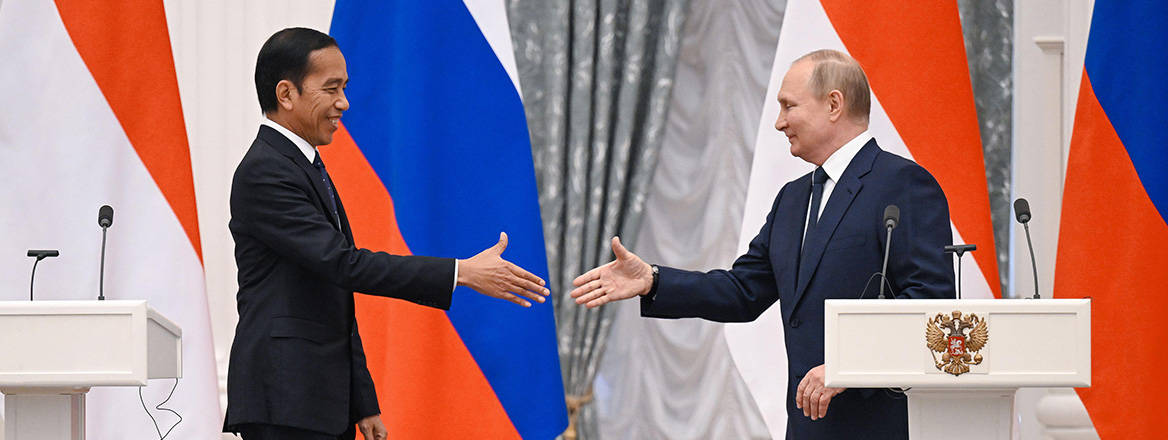Western Sanctions on Russia and the Global South’s Stance
The Russia–Ukraine war has split the world into those who adhere to Western sanctions and those who do not. But the reality is more complex.
Since February 2022, Western sanctions against Russia following its full-scale invasion of Ukraine have included actions against its financial system, its oil and gas sector and individuals linked to President Vladimir Putin. The rationale for these sanctions is simple: the invasion of Ukraine was unlawful and as a result, the world should condemn it and take the necessary steps to reverse the Kremlin’s aggression. While Ukraine’s allies, led by the G7, have managed to convince some countries to follow suit, others – predominantly from the Global South – have displayed little enthusiasm for adhering to unilateral sanctions against Russia.
There is no one factor that has determined non-compliance, with reasons including a range of economic and geopolitical interests, widespread suspicion of unilateral sanctions, and historical anti-Western sentiments. One response to this indifference has been the growing indication – a maximalist one – from the EU, the US and other Ukraine allies of the possible imposition of restrictive measures against these countries (or at least their companies) to force compliance.
Rather than coercing these countries, the West should adopt a strategy of persuasion, increase cooperation by strengthening its links with countries in the Global South while acknowledging their connections with Russia.
Russia and the Global South
Countries in the Global South have unique relationships with Russia and the West and attitudes towards the imposition of unilateral sanctions. Brazil, China, India, Indonesia, South Africa, Turkey and the UAE are just a few of the key players in the Global South that have remained opposed or neutral to unilateral sanctions. A June 2023 joint statement by the foreign ministers of Brazil, Russia, India, China and South Africa (collectively the ‘BRICS’) expressed that the use of unilateral sanctions is ‘incompatible’ with the UN Charter; yet at the same time, as highlighted by UN Secretary-General Antonio Guterres, Russia’s invasion of Ukraine is also in violation of the UN Charter (Article 2(4)) on territorial integrity and international law.
This was not the first time the BRICS countries have expressed a dissenting view. In 2014, in the VI BRICS Summit Fortaleza Declaration, the BRICS condemned ‘…unilateral military interventions and economic sanctions in violation of international law and universally recognized norms of international relations’. Similarly, Turkish Foreign Minister Mevlut Cavusoglu stated in 2023 that Turkey does not take part in unilateral sanctions but abides by UN decisions. Likewise, in 2022, the Indonesian Ministry of Foreign Affairs spokesperson, Teuku Faizasyah, stated that Indonesia would not impose any sanctions on Russia, further noting that the country would not ‘blindly follow steps taken by another country’ and that the decision to impose sanctions would be based on ‘domestic interests and (the consideration) of whether sanctions would solve anything’.
The Global South’s relationship with Russia is not just defined by contemporary geopolitics; it is also mired in history, economic ties and diplomacy
These non-aligned and neutral positions were also reflected in the UN General Assembly vote condemning Russia over its invasion of Ukraine. While Brazil, Indonesia, Turkey and the UAE were in favour of condemnation, some key Global South countries including China, India and South Africa abstained. These countries’ respective positions are not surprising given their diplomatic relations with Russia and the economic consequences of the war for their own economies.
While many of these countries have denounced Russia for its aggression, some do not see the benefit of positioning themselves between Western democracies and Russia. The Global South’s relationship with Russia is not just defined by contemporary geopolitics; it is also mired in history, economic ties and diplomacy. A recent survey in India, for instance, found that respondents viewed Russia as the country’s ‘most reliable partner’ since its independence in 1947.
Likewise, economic and trade interdependence between Russia and Turkey contributes to the core motivation behind their relations. Yet geopolitical realities place Turkey in a complicated position since it is a NATO member and has expressed support for Ukraine’s sovereignty, but at the same time maintains important economic relations with Moscow, as evidenced by the rise in Turkish exports to Russia since the war. Indonesia also shares historic ties with Russia ranging from military to agricultural cooperation. The country’s complicated relationship with Russia is reflected in the fact that despite Indonesia’s condemnation of Russia in the UN General Assembly vote, a recent survey showed a significant majority of Indonesians were in favour of maintaining ‘economic ties with Russia’.
Beyond these individual considerations, Global South countries are feeling the effect of Russia’s war in Ukraine on their domestic economies. Data from the UN Department of Economic and Social Affairs indicates that global output growth is expected to decelerate to 1.9% in 2023 from 3% in 2022. While the immediate economic impact of the war is being felt by Ukraine and its allies, Global South countries face significant secondary effects despite not having any direct involvement, with consequences ranging from rising inflation affecting food, fertilisers, energy and fuel prices to the disruption of global supply chains.
A Lack of Attentiveness
At the heart of this issue lies a lack of understanding between the West and the Global South, primarily because the strategic priorities and choices of the latter differ from those of the West.
The way forward for the West is thus not to focus on garnering support for the sanctions regime but to bolster relationships with the Global South
Global South countries have manifold significant priorities of their own. These include the negative economic impact of Covid-19; combatting the severe effects of rapid climate change such as increasing flood risks in Indonesia, rising sea levels in India and changes in rainfall patterns in South Africa; and the various ongoing border conflicts between countries in the region. Failing to acknowledge and support these priorities while pushing the Global South to prioritise sanctions alignment in the wake of the war in Ukraine could be perceived as a counterproductive strategy and reflective of a lack of attentiveness by the West.
Improving Compliance Through Engagement
With this background in mind, the West should generate solutions beyond sanctions. This could start with heightened collaboration, both bilaterally and multilaterally. Data shows that the original BRICS members have so far contributed 26.3% of global GDP in 2023, amounting to around $27.6 trillion. With the new members that have been invited to join the grouping, its total global share would increase to 29.3%. Therefore, BRICS countries with their fast-growing economies offer opportunities to engage, discuss and negotiate on trade and cooperation on the economic, political and cultural front – something that would benefit both the West and the rest.
Engagement can also extend via the G20 to the public sector, the private sector and civil society in the Global South. This could include a continued effort to boost investment in the private sector including power, water, sanitation and transport to not just mobilise but also finance the pursuit of the Sustainable Development Goals.
The way forward for the West is thus not to focus on garnering support for the sanctions regime but to bolster relationships with the Global South. This could be accomplished by capitalising on the disparity among these countries and incentivising them to work more collaboratively with the West through consistent engagement on issues that are important for them. This is more likely to result in the kind of engagement the West is looking for if the Global South’s unique and distinctive connections are acknowledged and maximised as part of efforts to end the war.
The views expressed in this Commentary are the author’s, and do not represent those of RUSI or any other institution.
Have an idea for a Commentary you’d like to write for us? Send a short pitch to commentaries@rusi.org and we’ll get back to you if it fits into our research interests. Full guidelines for contributors can be found here.
WRITTEN BY
Chandana Seshadri
Guest Contributor
- Jim McLeanMedia Relations Manager+44 (0)7917 373 069JimMc@rusi.org


